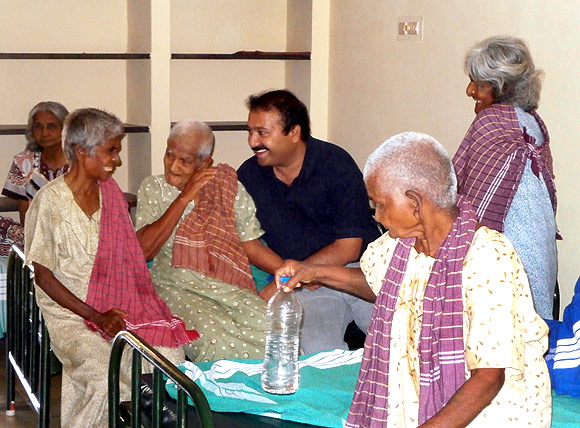
‘Twelve people have been rehabilitated since we opened this home. We did not give them any medicine nor were they treated by any psychiatrist. All I did was sit down with them and listen. Once they poured out all the angst in their hearts they became normal,' Narayan Krishnan, the Mother Teresa of Madurai, tells A Ganesh Nadar
If one soul has breathed easier because you were there, your life is a success – Narayan Krishnan
Narayanan Krishnan is to Madurai what Mother Teresa was to Kolkata. Since 2002 he has been feeding the mentally-ill on the streets of Madurai. He feeds 450 mentally-ill persons three meals a day, every day, all 365 days of the year.
This he does by taking the food to them in his Maruti Omni van that runs in winter, summer, spring and the monsoons.
Three years back he embarked on a gigantic mission to provide a home for these destitute. His dream has succeeded and now there is an Akshaya home on the outskirts of Madurai.
Set in a four-acre area he has planted 700 seedlings around the building. “This will be a paradise once all the trees grow,” he says, enthusiasm lighting up his smiling visage.
The kitchen is big, the utensils are of stainless steel and heavy. The kitchen is the latest in modern technology. The storage room contains provisions for a month, everything is sparkling clean. After all, Krishnan gave up his job in a five-star hotel for this. He maintains five-star standards in everything he does.
There are dormitories lining the huge corridors filled with people, most of them are old. Some smile at you, one ran to hug Krishnan, but most of them just ignore you and stare blankly.
Please ...
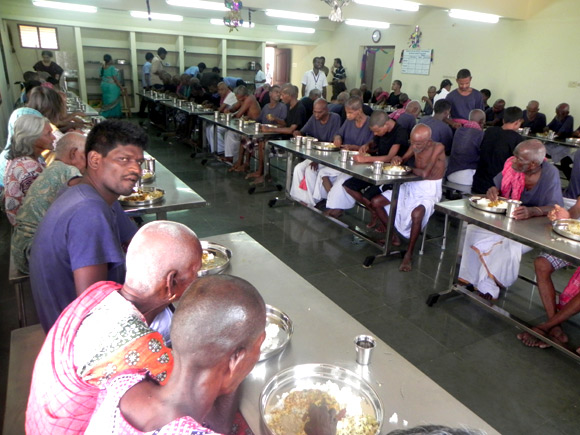
It’s 11 am and tea is being served to all the inmates. One room, he said, was occupied by people who had problems with their bones, another had patients with wounds. There was also an ICU ward if someone fell seriously ill.
In the women’s dormitory an old lady was saying, “Now I am old but once upon a time I was a beauty.” She hugged Krishnan and invited us to sit down. “This place is so clean and that you can eat food off the floor,” she says.
Another old lady put her hand on Krishnan’s head and said, “I don’t have any children of my own, you are my child and I bless you.”
One lady had a bandage around her ankle. “They have not put the bandage properly, please ask them to do it again.”
Krishnan said one of the inmates needed to have his hand amputated and it was being done in a local private hospital today.
Moving to his office he introduced us to two young software professionals who were in charge of putting computerising all their accounts. “They have given up high-paying jobs to work here,” said Krishnan. Another young boy had given up a government job for it.
When I pointed out that there were no young people among the inmates, he replied, “Young people who have not faced the rigours of life will never be mentally-ill. Only those who have come up against life’s problems and lost become mentally-ill. Most become like this because no one listens to them.”
“Twelve people have been rehabilitated since we opened this home. We did not give them any medicine nor were they treated by any psychiatrist. All I did was sit down with them and listen. Once they poured out all the angst in their hearts they became normal. See this man who is giving us tea, he was once like them. Now he is like you and me.”
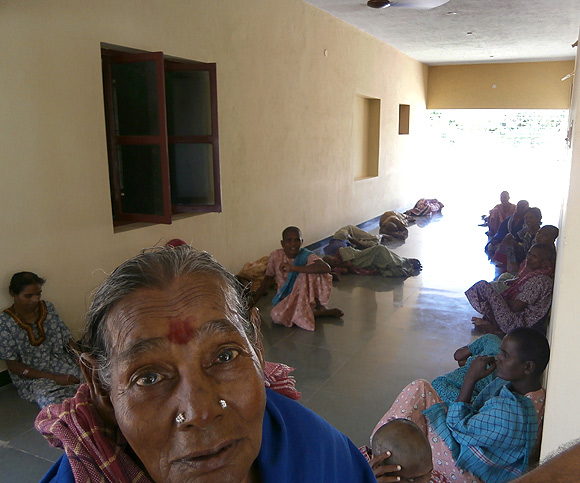
There are 220 people housed here. All of them are not mentally-ill. Some are old and helpless. Others have serious ailments. “The minute you don’t have money to pay, hospitals dump you, we bring them here,” he said matter-of-factly. “Rameswaram and Madurai are favourite dumping grounds for families who have mentally-ill, or old people. They just go there on a pilgrimage and leave them behind,” he said.
“I am aiming for 300 people now, we bring a few in every night. We keep them separately for three days, till they adjust, and then move them to the general dormitories. For three days we observe them carefully to study their habits.”
While this home is doing its work, the daily feeding ritual for those on the streets continues relentlessly. “It will go on till I can bring all of them here,” he said.
There were solar cells on the top of the building. “They were provided by the Tatas and supply 25 per cent of our electricity needs.” He has giant generators, as he doesn’t want his inmates suffering when the electricity plays truant. – as it does often in the state.
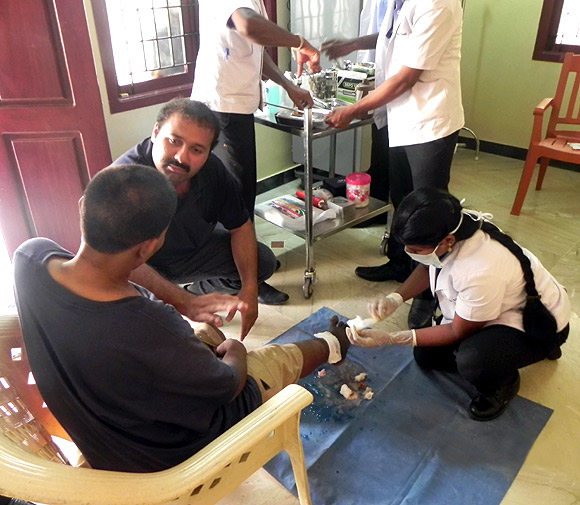
Basically the problem with the mentally-ill is they don’t know about personal hygiene, how do you maintain that?
Yes! They don’t know how to bathe themselves, how to wash themselves after they use the toilet, even to wash their hands after a meal. We have appointed 12 house keeping staff and 12 well qualified nursing staff to look after them. Out of the 12 nursing staff six have been trained in different hospitals where they have already dealt with mentally-ill people.
The beauty of it all is that after four days of the staff cleaning them up after they use the toilet, they start doing it themselves and very well. They learn by imitating and do it better. Eighty pc of them learn like that. Twenty pc are too old to do it themselves.
The old ones we put them in diapers every night. It’s definitely a very big task to maintain them.
They are used to roaming around. When you confine them in however big a place, do they become physically violent?
This is a four-acre place with 60,000 square feet of built-up area. That depends on the architecture. If you confine them to one big hall with four walls and less ventilation there is a possibility of them becoming violent.
We have huge corridors, there are spaces between blocks, there is a garden area and a play area. All the rooms are well-ventilated. There are plenty of windows. Also, the speciality of this area is that we have a hill view on all sides. Whichever window they look out of they will see a hill.
The idea is of open air. They don’t realise that they are confined. There are no buildings in this area. You can see the hills from every side. The only place he will feel confined is the roof. As long as he doesn’t look up, he will always see open space.
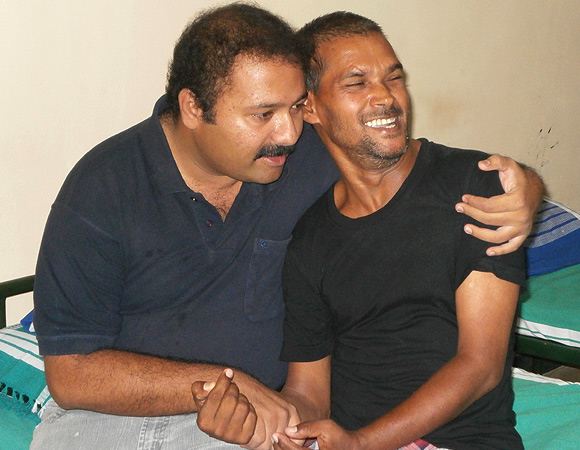
God forbid someone tries to commit suicide or maybe even murder a fellow inmate, after all they are mentally-ill. What then?
Murder is out of the question because he will never find a weapon here. We make sure that no sharp objects, even kitchen knives, are available to them. No one can commit suicide here.
There are 600 fans on these premises. All of them have a spring attached to them. If anything more than the weight of the fan is attached to them, they will come down by three feet and so no one can die by that method.
Yes, they can bang their heads on the wall, but that is painful so they won’t do that.

Is there any legal impediment in keeping people confined?
I have permission from the fire department, health department, sanitary department and the social welfare department.
Another precaution we take is to take their photograph where they are, a photo when they come here and a photo after shaving, bathing and dressing here. This is to make sure they or any relative doesn’t accuse us of keeping them here in worse condition.
Another thing is that if you think too much about these things you can never do any good in your life. I am ready to jump into the well without knowing its depth as I know swimming. If I need help I am sure someone will come forward.
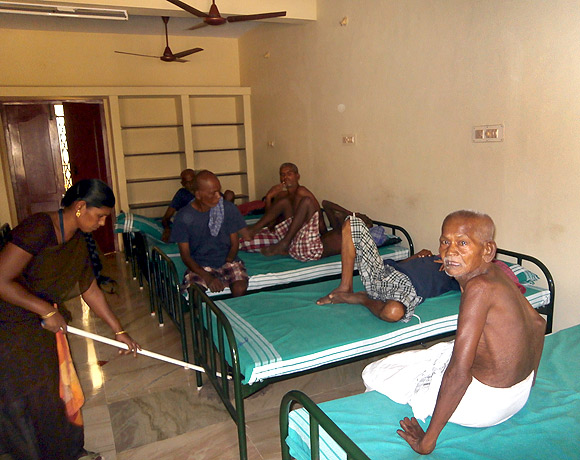
Some years back you said you spent 8,000 rupees a day on feeding alone, now you say its 30,000 rupees a day. Who are the sponsors?
We get a lot of small amounts from 500 to 3000 rupees. Some of our earlier sponsors went up from 8000 rupees a day to 30,000 rupees a day but not all of them. So we are facing some shortfall. I have to pay electricity charges, when there is a water shortage I have to buy from tankers. I buy medicines worth Rs 1.5 lakh every month.
There are laundry and cleaning expenses. I pay salary to 24 fulltime staff. We need Rs 15 lakh a month to sustain ourselves. Rs 9 lakh per month is only the food bill. We are still feeding people on the roads. Akshaya has never stopped that and will not stop till all of them are here.
I have confidence that there are hundreds and thousands of people who will donate to the right cause. Our accounts are 100 per cent transparent. You know, I still have the first bill for vegetables I bought in 2002.
India is a rich country and I am sure corporates will come forward to take care of the expenses so that we can continue with our work.